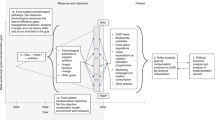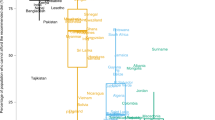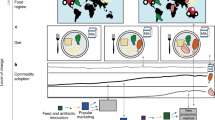Abstract
Redesigning food production and consumption is key to limiting global warming, soil erosion and biodiversity loss. Yet, transforming the food system may involve political feasibility problems, as potentially effective policy interventions interfere with citizens’ daily lives. Here, we show that policy packaging—the systematic bundling of different policy measures—can help to mitigate the potential trade-off between political feasibility and problem-solving effectiveness. We use conjoint experiments with citizens from China, Germany and the United States to scrutinize support for different combinations of policies aimed at reducing food systems’ environmental impacts. Our results do not support the widespread claim that costly market-based or push measures per se receive less support than non-market-based or pull measures. Instead, they show that citizens are likely to support even costly policies, but this support varies by country and depends on the specific combination of policy measures, their stringency and revenue earmarking.
This is a preview of subscription content, access via your institution
Access options
Access Nature and 54 other Nature Portfolio journals
Get Nature+, our best-value online-access subscription
$29.99 / 30 days
cancel any time
Subscribe to this journal
Receive 12 digital issues and online access to articles
$119.00 per year
only $9.92 per issue
Buy this article
- Purchase on Springer Link
- Instant access to full article PDF
Prices may be subject to local taxes which are calculated during checkout




Similar content being viewed by others
Data availability
All data and associated code for replicating the experimental results presented in Figs. 1–4 of the paper as well as the results presented in the Supplementary Information are publically available at the Harvard Dataverse: https://doi.org/10.7910/DVN/FR73RE.
References
Bajželj, B. et al. Importance of food-demand management for climate mitigation. Nat. Clim. Change 4, 924–929 (2014).
Springmann, M. et al. Mitigation potential and global health impacts from emissions pricing of food commodities. Nat. Clim. Change 7, 69–74 (2017).
Springmann, M. et al. Options for keeping the food system within environmental limits. Nature 562, 519–525 (2018).
Godfray, J. et al. Meat consumption, health, and the environment. Science 361, eaam5324 (2018).
Poore, J. & Nemecek, T. Reducing food’s environmental impacts through producers and consumers. Science 992, 987–992 (2018).
Creutzig, F. et al. Towards demand-side solutions for mitigating. Nat. Clim. Change 8, 260–271 (2018).
Steg, L. Limiting climate change requires research on climate action. Nat. Clim. Change 8, 759–761 (2018).
Lemken, D., Kraus, K., Nitzko, S. & Spiller, A. Staatliche Eingriffe in die Lebensmittelwahl: Welche klimapolitischen Instrumente unterstützt die Bevölkerung? GAIA 27, 363–372 (2018).
Fesenfeld, L. P., Schmidt, T. S. & Schrode, A. Climate policy for short- and long-lived pollutants. Nat. Clim. Change 8, 933–936 (2018).
Bataille, C., Guivarch, C., Hallegatte, S., Rogelj, J. & Waisman, H. Carbon prices across countries. Nat. Clim. Change 8, 648–650 (2018).
Fesenfeld, L. P. The Effects of Policy Packaging on Public Support for Transformative Policies (Department of Humanities, Social and Political Sciences, ETH Zurich, 2018); https://doi.org/10.3929/ethz-b-000397449
Fesenfeld, L. Governing urban food systems in the long-run: comparing best practices in sustainable food procurement regulations. GAIA 25, 260–270 (2016).
Alexander, P., Reddy, A., Brown, C., Henry, R. C. & Rounsevell, M. D. A. Transforming agricultural land use through marginal gains in the food system. Glob. Environ. Change 57, 101932 (2019).
Klenert, D. et al. Making carbon pricing work for citizens. Nat. Clim. Change 8, 669–677 (2018).
Wicki, M., Fesenfeld, L. & Bernauer, T. In search of politically feasible policy-packages for sustainable transport: insights from choice experiments in China, Germany, and the USA. Environ. Res. Lett. 14, 084048 (2019).
Bernauer, T. Climate change politics. Annu. Rev. Polit. Sci. 16, 421–448 (2013).
Pahle, M. et al. Sequencing to ratchet up climate policy stringency. Nat. Clim. Change 8, 861–867 (2018).
Schaffrin, A., Sewerin, S. & Seubert, S. Toward a comparative measure of climate policy output. Policy Stud. J. 43, 257–282 (2015).
Rhodes, E., Axsen, J. & Jaccard, M. Does effective climate policy require well-informed citizen support? Glob. Environ. Change 29, 92–104 (2014).
Stokes, L. C. Electoral backlash against climate policy: a natural experiment on retrospective voting and local resistance to public policy. Am. J. Pol. Sci. 60, 958–974 (2016).
Stadelmann-Steffen, I. & Dermont, C. The unpopularity of incentive-based instruments: what improves the cost–benefit ratio? Public Choice 175, 37–62 (2018).
OECD–FAO Agricultural Outlook 2018–2027 (OECD, 2018).
Ecological Footprint Explorer (Global Footprint Network, 2018); https://data.footprintnetwork.org/#/
Hainmueller, Hopkins, D. J. & Yamamoto, T. Causal inference in conjoint analysis: understanding multidimensional choices via stated preference experiments. Polit. Anal. 22, 1–30 (2014).
Hainmueller, J., Hangartner, D. & Yamamoto, T. Validating vignette and conjoint survey experiments against real-world behavior. Proc. Natl Acad. Sci. USA 112, 2395–2400 (2015).
Bansak, K., Hainmueller, J. & Hangartner, D. How economic, humanitarian, and religious concerns shape European attitudes toward asylum seekers. Science 354, 217–222 (2016).
Carattini, S., Carvalho, M. & Fankhauser, S. Overcoming public resistance to carbon taxes. Wiley Interdiscip. Rev. Clim. Change 9, e531 (2018).
Drews, S. & van den Bergh, J. C. J. M. What explains public support for climate policies? A review of empirical and experimental studies. Clim. Policy 16, 855–876 (2016).
Huber, R., Wicki, M. & Bernauer, T. Public support for environmental policy depends on beliefs concerning effectiveness, intrusiveness, and fairness. Env. Polit. https://doi.org/10.1080/09644016.2019.1629171 (2019).
Beiser-McGrath, L. F. & Bernauer, T. Could revenue recycling make effective carbon taxation politically feasible? Sci. Adv. 5, eaax3323 (2019).
Hahn, R. W. & Stavins, R. N. Economic incentives for environmental protection: integrating theory and practice. Am. Econ. Rev. 82, 464–468 (1992).
Kallbekken, S. & Sæælen, H. Public acceptance for environmental taxes: self-interest, environmental and distributional concerns. Energy Policy 39, 2966–2973 (2011).
Cherry, T. L., Kallbekken, S. & Kroll, S. The acceptability of efficiency-enhancing environmental taxes, subsidies and regulation: an experimental investigation. Environ. Sci. Policy 16, 90–96 (2012).
Kirchgässner, G. & Schneider, F. On the political economy of environmental policy. Public Choice 115, 369–396 (2003).
Fairbrother, M. When will people pay to pollute? Environmental taxes, political trust and experimental evidence from Britain. Br. J. Polit. Sci. 46, 661–682 (2019).
Häusermann, S., Kurer, T. & Traber, D. The politics of trade-offs: studying the dynamics of welfare state reform with conjoint experiments. Comp. Polit. Stud. 52, 1059–1095 (2018).
Rinscheid, A. & Wüstenhagen, R. Germany’s decision to phase out coal by 2038 lags behind citizens’ timing preferences. Nat. Energy 4, 856–863 (2019).
Zhang, L., Xu, Y., Oosterveer, P. & Mol, A. P. J. Consumer trust in different food provisioning schemes: evidence from Beijing, China. J. Clean. Prod. 134, 269–279 (2016).
Bernauer, T., Prakash, A. & Beiser-McGrath, L. F. Do exemptions undermine environmental policy support? An experimental stress test on the odd–even road space rationing policy in India. Regul. Gov. https://doi.org/10.1111/rego.12225 (2018).
Meckling, J., Kelsey, N., Biber, E. & Zysman, J. Winning coalitions for climate policy. Science 349, 1170–1171 (2015).
Schmid, N., Sewerin, S. & Schmidt, T. Explaining advocacy coalition change with policy feedback. Policy Stud. J. https://doi.org/10.1111/psj.12365 (2019).
Schmidt, T. S. & Sewerin, S. Technology as a driver of climate and energy politics. Nat. Energy 2, 170–184 (2017).
Oates, W. E. & Portney, P. R. in Handbook of Environmental Economics 325–354 (Elsevier, 2003).
Culpepper, P. D. Quiet Politics and Business Power: Corporate Control in Europe and Japan (Cambridge Univ. Press, 2010).
Weaver, R. K. The politics of blame avoidance. J. Public Policy 6, 371–398 (1986).
Wiedenhofer, D. et al. Unequal household carbon footprints in China. Nat. Clim. Change 7, 75–80 (2017).
De Mesquita, B. B., Smith, A., Morrow, J. D. & Siverson, R. M. The Logic of Political Survival (MIT Press, 2005).
Burstein, P. The impact of public opinion on public policy: a review and an agenda. Polit. Res. Q. 56, 29–40 (2003).
Anderson, B., Böhmelt, T. & Ward, H. Public opinion and environmental policy output: a cross-national analysis of energy policies in Europe. Environ. Res. Lett. 12, 114011 (2017).
Acknowledgements
The research for this article was funded by the ERC Advanced Grant ‘Sources of Legitimacy in Global Environmental Governance’ (grant number 295456) and supported by ETH Zürich. We are grateful for valuable comments by B. Anderson, G. Brückmann, F. Egli, L. F. Beiser-McGrath, R. Hess, R. Huber, D. Kolcava, V. Koubi, S. Mohrenberg, Q. Nguyen, D. Presperger, A. Rinscheid, L. Rudolph, A. Schrode and F. Quoss, as well as the interviewed experts and anonymous reviewers. The ETH ethics commission provided guidelines for the study procedures and approved the study.
Author information
Authors and Affiliations
Contributions
L.P.F., M.W., Y.S. and T.B. developed the study concept and survey design. L.P.F. and Y.S. conducted the interviews. L.P.F. conducted the analyses and interpreted and prepared the results. The other authors supported interpretation of the results. L.P.F. wrote the paper with input from the other authors.
Corresponding author
Ethics declarations
Competing interests
The authors declare no competing interests.
Additional information
Publisher’s note Springer Nature remains neutral with regard to jurisdictional claims in published maps and institutional affiliations.
Extended data
Extended Data Fig. 1 Example of experimental conjoint choice and rating task.
We showed study participants four such pairs of random policy packages and asked them to decide which proposal they preferred within each pair, both in a forced-choice question and on a seven-point rating scale. The different policy design attributes were described to respondents prior to the four choice tasks.
Supplementary information
Supplementary Information
Supplementary Tables 1–5, Figs. 1–3 and survey Instrument.
Rights and permissions
About this article
Cite this article
Fesenfeld, L.P., Wicki, M., Sun, Y. et al. Policy packaging can make food system transformation feasible. Nat Food 1, 173–182 (2020). https://doi.org/10.1038/s43016-020-0047-4
Received:
Accepted:
Published:
Issue Date:
DOI: https://doi.org/10.1038/s43016-020-0047-4
This article is cited by
-
Agri-environmental policies from 1960 to 2022
Nature Food (2024)
-
Animal welfare is a stronger determinant of public support for meat taxation than climate change mitigation in Germany
Nature Food (2023)
-
The political economy of taxing meat
Nature Food (2023)
-
Governance principles for accelerating food systems transformation in the European Union
Nature Food (2023)
-
Food systems transformation requires strategic attention to political economy
Nature Food (2023)



